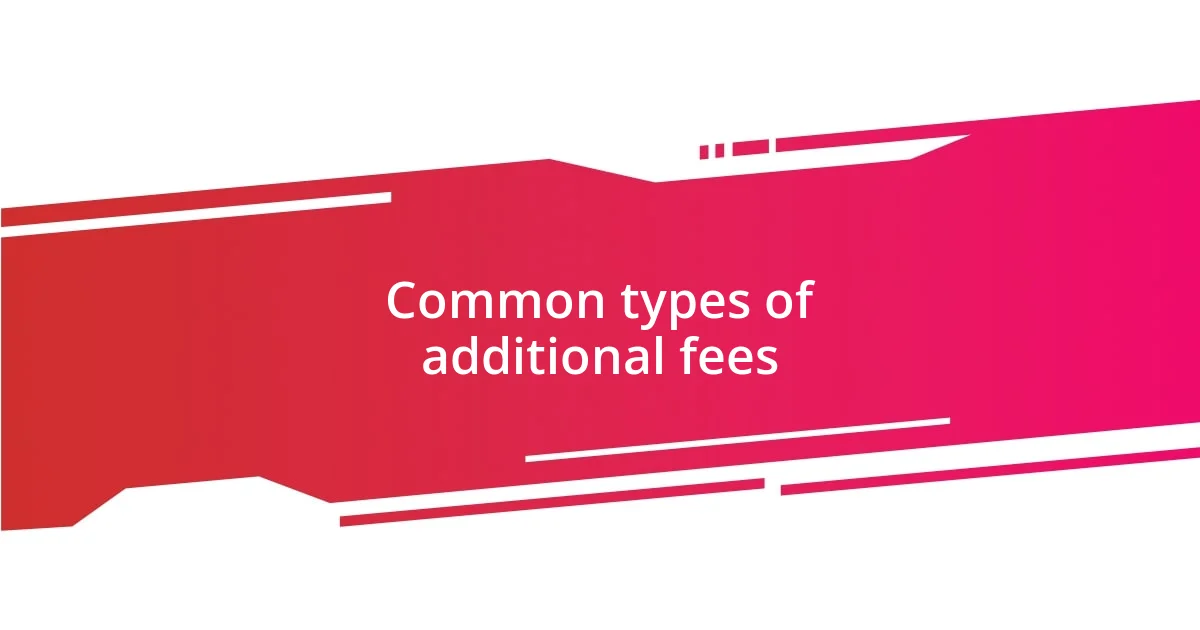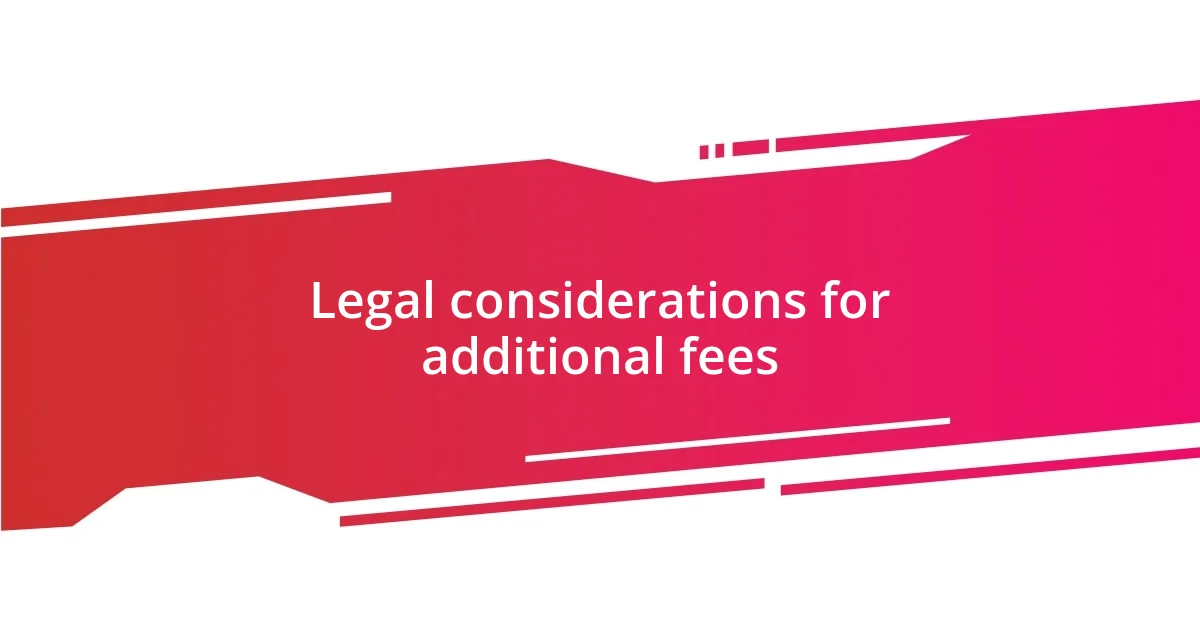Key takeaways:
- Additional fees can significantly increase costs unexpectedly, making it essential to understand and scrutinize fee structures before purchase.
- Common types of additional fees include service fees, resort fees, and foreign transaction fees, which can vary widely across industries and regions.
- Proactive strategies such as reading fine print, comparing prices, and being aware of local regulations can help minimize the impact of additional fees.

Understanding additional fees
When it comes to additional fees, it’s crucial to keep a close eye on those charges that pop up unexpectedly. I remember one time when I booked a flight, only to discover hidden fees for luggage that made me question whether the ticket was truly a good deal. Have you ever faced a similar situation where you felt blindsided? It’s all too common and speaks volumes about how we often overlook the fine print.
Many of us might think that additional fees are simply part of the deal, but understanding them can save us a lot of frustration down the road. I’ve learned that these fees can vary dramatically from one service to another, and some are downright ridiculous. For instance, I once encountered a hotel that charged for Wi-Fi in a world where connectivity is essentially a necessity. This realization not only made me feel annoyed but also more cautious about comparing costs before making a commitment.
Navigating through the maze of additional fees can often feel overwhelming. I’ve found that asking questions before making a purchase can shed light on what I might be missing. Have you ever asked a service provider to clarify their fee structure? It’s amazing how transparent they can become once you express your concerns. In my experience, being proactive about fees not only calms my own worries but also empowers me to make better financial decisions.

Common types of additional fees
When diving into the world of additional fees, I often find myself surprised by the variety that exists. Take service fees, for example; these can sneak into your bill during online bookings. I vividly recall booking a rental car and seeing a hefty “service charge” that wasn’t mentioned upfront. It made me wonder how many others might have been hit with that same unexpected fee.
Another common type of fee is the “resort fee” at hotels. I’ve stayed at places where the allure of an inexpensive room quickly faded as these fees stacked up, effectively increasing my total cost. One particular instance comes to mind: I checked into a lovely resort that looked like a paradise, only to find that I was charged extra for pool access and beach chairs. It felt like a bait and switch, leading me to scrutinize the fine print every time I book now.
Lastly, credit card companies often impose foreign transaction fees, which can leave travelers with a bitter taste. During a trip abroad, I was shocked to see that my credit card charged me for simply using it in a different country. It made me rethink my choice of card for international travel. Have you ever felt that sting from a fee that seemed avoidable? That experience has made me more diligent in researching credit options before heading out on an adventure.
| Type of Fee | Description |
|---|---|
| Service Fee | This fee is often added during booking processes, covering administrative costs. |
| Resort Fee | A daily fee applied at hotels for amenities often deemed complimentary. |
| Foreign Transaction Fee | A charge made by credit cards for purchases made in a foreign currency. |

Factors influencing additional fees
Factors influencing additional fees
One major factor that influences additional fees is the complexity and opacity of pricing structures in various industries. For instance, I remember buying tickets for a concert where the base price seemed reasonable, but the final total was shocking after adding in service fees and delivery charges. It sparked a realization: the less transparent the pricing, the more likely I was to face unexpected costs.
- Service Complexity: More services included often lead to higher fees.
- Industry Standards: Different industries have varying norms for charges.
- Booking Method: Online versus in-person booking can result in different fee structures.
Another aspect that plays a significant role is regional differences in pricing strategies. During a recent trip to Europe, I noticed several service providers had specific local fees that weren’t common in my hometown. It made me realize how local regulations and market practices shape the additional costs we incur. That’s something to keep in mind whenever I travel; fees can vary widely based on your location.
- Local Regulations: Laws can dictate how and what fees are charged.
- Market Demand: High demand locations often have inflated additional fees.
- Currency Fluctuation: Changing exchange rates can impact service costs internationally.

Evaluating the impact of fees
When assessing the impact of additional fees, it’s easy to overlook how these costs can shape our overall experience. I recall booking a flight with a seemingly low fare, only to have my excitement dwindle as I navigated through a labyrinth of extra charges for luggage and seat selection. It left me feeling frustrated and questioning whether the base fare was truly worth it. Have you ever found yourself in a similar predicament, feeling like a victim of hidden costs?
The emotional toll of unexpected fees can’t be understated. I once planned a weekend getaway and was drawn to a charming bed-and-breakfast, only to face surprise charges that doubled my anticipated expenses. This experience heightens one’s awareness and transforms a joyful planning process into a stressful numbers game. I wonder how many people have similarly left a booking feeling ambushed by financial surprises.
Delving deeper into these assessments, I find that the cumulative effect of fees can significantly alter our perception of value. For instance, while researching my recent travel plans, I felt disheartened to discover that additional fees on every aspect of the trip made my budget-friendly vacation escalate quickly into something far less affordable. How could a little thing like a service fee make such a substantial difference in my overall spending? It’s a wake-up call for many, prompting us to broaden our understanding of costs before committing.

Strategies to minimize additional fees
One effective strategy I’ve found for minimizing additional fees is to read the fine print carefully. There’s nothing worse than discovering a hefty additional charge after making a purchase. I once signed up for a subscription service, only to realize that canceling would cost me an extra fee. Being diligent and scrutinizing the terms not only saves money but also provides peace of mind.
Another approach is to compare prices across different platforms. I vividly recall searching for a hotel room and finding a price on one site that seemed unbeatable. However, after exploring a few more options, I found a better deal that included complimentary breakfast and free parking. I often remind friends that a few extra minutes spent comparing can lead to significant savings and reduce those pesky extra costs.
Lastly, consider timing your purchases strategically. I learned this lesson when booking flights; traveling on Tuesdays often yields lower fares. Additionally, I discovered that booking well in advance can help avoid last-minute price hikes. By being thoughtful about when and how I book, I’ve managed to keep those additional fees at bay while still enjoying my travels.

Case studies on additional fees
When I think about additional fees, one case that stands out is my experience with a popular streaming service. I signed up for a subscription, lured by the initial low price. However, I quickly learned that accessing certain movies or shows required purchasing extra add-ons. It felt like a bait-and-switch tactic, leaving me frustrated and wondering if I’d really signed up for what I thought I was getting. Have you felt the same sting when your favorite show suddenly isn’t included in your plan?
Another vivid case comes to mind from my vacation last summer. I decided to rent a car to explore a new city. The advertised rate looked fantastic until I arrived at the rental desk, where I was hit with additional fees for extra insurance coverage and toll road transponders. My excitement dulled as I watched the total climb well beyond my budget. Reflecting on this, I couldn’t help but think about how easily those unexpected charges can turn an adventure into financial regret.
A friend of mine faced a similar situation while booking a concert. The ticket price seemed reasonable, but when she filled her cart, she was shocked to find a hefty service fee tacked on at the end. She ended up spending significantly more than anticipated, which dampened her enthusiasm for the event. In moments like these, I can’t help but ask—how often do we let these extra fees dictate our choices, shifting our experience from joyous to stressful? It’s an important question, and one worth pondering as we navigate our financial decisions.

Legal considerations for additional fees
Legal considerations around additional fees can be quite complicated, and my experiences have taught me to tread carefully. For instance, I once faced a situation where a service provider charged late fees without clearly defining the terms upfront. It led me to wonder—how many others have stumbled into similar traps? Knowing your rights can empower consumers to question and challenge unjust charges.
Another important angle to consider is the disclosure of fees. I recall purchasing a gym membership where the initial contract omitted key details about annual fees. It wasn’t until I received the bill that I realized how much I’d actually have to pay. It’s crucial for businesses to provide transparent information, yet many times, consumers must advocate for themselves when they notice discrepancies.
I also think about the role of local laws regarding additional fees. When traveling, I’ve often encountered rental cars or hotels that had varying regulations based on location. Just the other day, while browsing online, I stumbled across a post verifying that some destinations have strict limits on what can be charged as extra fees. This insight inspired me—being aware of these regulations can be a game changer for anyone looking to dodge unexpected costs. Engaging with local consumer protection laws not only protects you but also enhances your overall experience.















